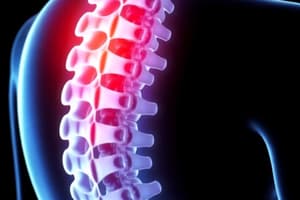Podcast
Questions and Answers
What are the leading causes of most back pain in primary care practice?
What are the leading causes of most back pain in primary care practice?
- Facet arthritis, recurring mild discomfort, and degenerative disk disease
- Musculoligamentous strain, degenerative disk disease, and facet arthritis (correct)
- Tumor, infection, and vertebral compression fracture
- Sciatica, disk disease, and musculoligamentous strain
What is often responsible for recurring mild discomfort of the low back and episodes of severe back pain with sciatica?
What is often responsible for recurring mild discomfort of the low back and episodes of severe back pain with sciatica?
- Musculoligamentous strain
- Disk disease (correct)
- Facet arthritis
- Tumor
What must be kept in mind when considering serious underlying problems causing back pain?
What must be kept in mind when considering serious underlying problems causing back pain?
- Tumor, infection, or vertebral compression fracture (correct)
- Sciatica, disk disease, and musculoligamentous strain
- Facet arthritis, recurring mild discomfort, and degenerative disk disease
- Musculoligamentous strain, degenerative disk disease, or facet arthritis
What is the recommended imaging study for suspected cauda equina syndrome?
What is the recommended imaging study for suspected cauda equina syndrome?
Which symptom suggests ankylosing spondylitis?
Which symptom suggests ankylosing spondylitis?
What does overreliance on imaging studies for back pain evaluation lead to?
What does overreliance on imaging studies for back pain evaluation lead to?
Which imaging study is superior to CT for detecting disk pathology?
Which imaging study is superior to CT for detecting disk pathology?
What percentage of low back pain is accounted for by mechanical causes?
What percentage of low back pain is accounted for by mechanical causes?
In which position does worsening of symptoms suggest lumbar disk herniation?
In which position does worsening of symptoms suggest lumbar disk herniation?
What does pain in atypical locations or worsening on lying supine suggest?
What does pain in atypical locations or worsening on lying supine suggest?
What is the estimated MRI sensitivity for cancer-related back pain?
What is the estimated MRI sensitivity for cancer-related back pain?
What is the test of choice for detecting soft tissue pathology and early osteomyelitis?
What is the test of choice for detecting soft tissue pathology and early osteomyelitis?
When is prompt spinal radiography indicated for high lumbar or thoracic back pain?
When is prompt spinal radiography indicated for high lumbar or thoracic back pain?
What percentage of back pain cases are mechanical in origin?
What percentage of back pain cases are mechanical in origin?
What is a suggested clinical presentation of bony metastasis?
What is a suggested clinical presentation of bony metastasis?
What is a characteristic of epidural invasion?
What is a characteristic of epidural invasion?
What may indicate the presence of intraspinal tumors?
What may indicate the presence of intraspinal tumors?
What is a characteristic of vertebral osteomyelitis?
What is a characteristic of vertebral osteomyelitis?
How does epidural abscess typically develop?
How does epidural abscess typically develop?
What may patients with depression present with?
What may patients with depression present with?
What is a characteristic of cauda equina syndrome?
What is a characteristic of cauda equina syndrome?
What does piriformis syndrome cause?
What does piriformis syndrome cause?
What percentage of back pain cases are due to infection, neoplasia, or inflammatory disease?
What percentage of back pain cases are due to infection, neoplasia, or inflammatory disease?
What is the most common cause of spinal stenosis?
What is the most common cause of spinal stenosis?
What is the typical duration of low back pain in ankylosing spondylitis?
What is the typical duration of low back pain in ankylosing spondylitis?
What is the most common primary bone tumor involving the spine?
What is the most common primary bone tumor involving the spine?
What is the characteristic presentation of individuals with metastatic disease as the cause of back pain?
What is the characteristic presentation of individuals with metastatic disease as the cause of back pain?
What is the most common spinal tumor?
What is the most common spinal tumor?
What can neoplasms in the spine lead to?
What can neoplasms in the spine lead to?
What is the typical age range for individuals affected by myeloma involving the spine?
What is the typical age range for individuals affected by myeloma involving the spine?
What is the characteristic pain pattern in individuals with metastatic disease as the cause of back pain?
What is the characteristic pain pattern in individuals with metastatic disease as the cause of back pain?
What is the characteristic duration of low back pain in ankylosing spondylitis?
What is the characteristic duration of low back pain in ankylosing spondylitis?
What is the typical slippage percentage in spondylolisthesis in adults?
What is the typical slippage percentage in spondylolisthesis in adults?
What is the characteristic pain pattern in individuals with spinal stenosis?
What is the characteristic pain pattern in individuals with spinal stenosis?
What is the typical age range for individuals affected by myeloma involving the spine?
What is the typical age range for individuals affected by myeloma involving the spine?
Flashcards are hidden until you start studying
Study Notes
Back Pain Differential Diagnosis
- Clinical presentation of insidious onset of back pain, gradually increasing in severity, aggravated by activity and lying down, and may occur anywhere in the spine.
- Bony metastasis is suggested by worsening with activity, lack of relief on lying down, atypical location, and focal spinous tenderness.
- Epidural invasion manifests as increasing back pain followed by neurologic symptoms, upper motor neuron signs, sensory loss, and autonomic dysfunction.
- Intraspinal tumors may present similarly to herniated disks, but marked progression of neurologic deficits despite conservative therapy indicates a tumor.
- Extraspinal tumors may cause root impingement and simulate discogenic sciatica, with metastases occurring earlier.
- Infections causing back pain are rare but important to detect, with identifiable sources found in 40% of cases.
- Vertebral osteomyelitis is usually hematogenous and may extend into the disk space, producing painful discitis.
- Epidural abscess develops in the context of bacteremia or osteomyelitis and presents as back pain, focal tenderness, and fever.
- Patients with depression may present with chronic low back pain, often amplifying the presentation and prolonging the clinical course.
- Cauda equina syndrome presents with urinary retention in almost 90% of cases, saddle anesthesia in about 75% of patients, and lower extremity motor and sensory deficits.
- Piriformis syndrome causes sciatic nerve pain due to compression by the piriformis muscle, with focal pain in the midbuttock and tenderness in the sciatic notch.
- The vast majority of back pain cases (97%) are mechanical in origin, with less than 1% due to infection, neoplasia, or inflammatory disease, and about 2% representing referred pain from visceral disease.
Spinal Disorders and Conditions: Key Points
- Spinal stenosis is characterized by pain exacerbated by standing and walking, relieved by rest and flexing the spine and hips
- Symptoms can mimic vascular insufficiency and are sometimes referred to as "pseudoclaudication" or "neuroclaudication"
- The natural history of spinal stenosis is generally favorable, with only 15% of patients reporting clinical worsening over 5 years
- Spondylolisthesis in adults results from degenerative changes and arthritis of the facet joints, usually at L4 to L5 or L5 to S1, with 10% to 20% forward slippage
- Ankylosing spondylitis is the most common seronegative spondyloarthropathy and is characterized by low back pain of at least 3 months' duration, improvement with exercise but not with rest, and bilateral sacroiliitis or severe unilateral disease
- Vertebral compression fractures are acutely painful and are most commonly seen in elderly persons with severe osteoporosis, patients taking long-term glucocorticoids, and cancer patients with lytic bony metastases
- Metastatic carcinoma is the most common spinal tumor, with breast, lung, prostate, gastrointestinal, and genitourinary neoplasms commonly metastasizing to the spine
- Myeloma is the most common primary bone tumor involving the spine, typically affecting individuals older than 50 years
- Metastasis to the spine is hematogenous to the marrow of the vertebral bodies, leading to pain and potential neurologic deficits
- Approximately 90% of individuals with metastatic disease as the cause of back pain report night pain and pain unrelieved or worsened by lying down or bed rest
- Neoplasms in the spine can lead to spinal cord compression and vascular compromise, contributing to cord injury
- A history of prior malignancy, insidious increase in pain in a region atypical for disk disease, and failure to obtain relief by lying down are highly predictive of metastatic tumor
Studying That Suits You
Use AI to generate personalized quizzes and flashcards to suit your learning preferences.





